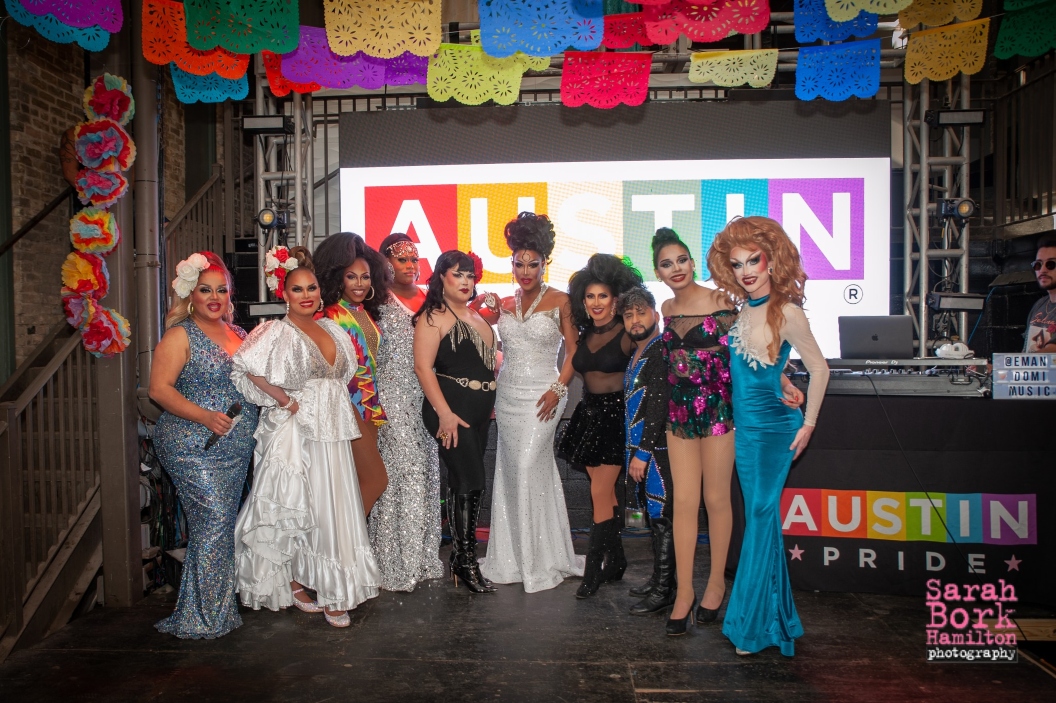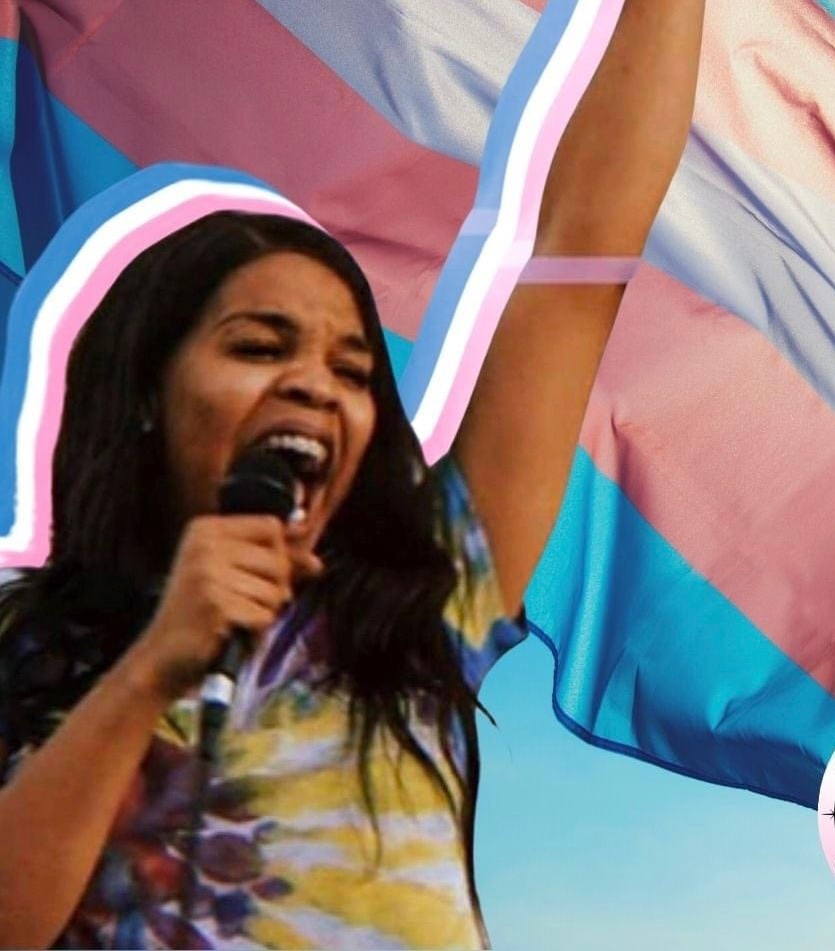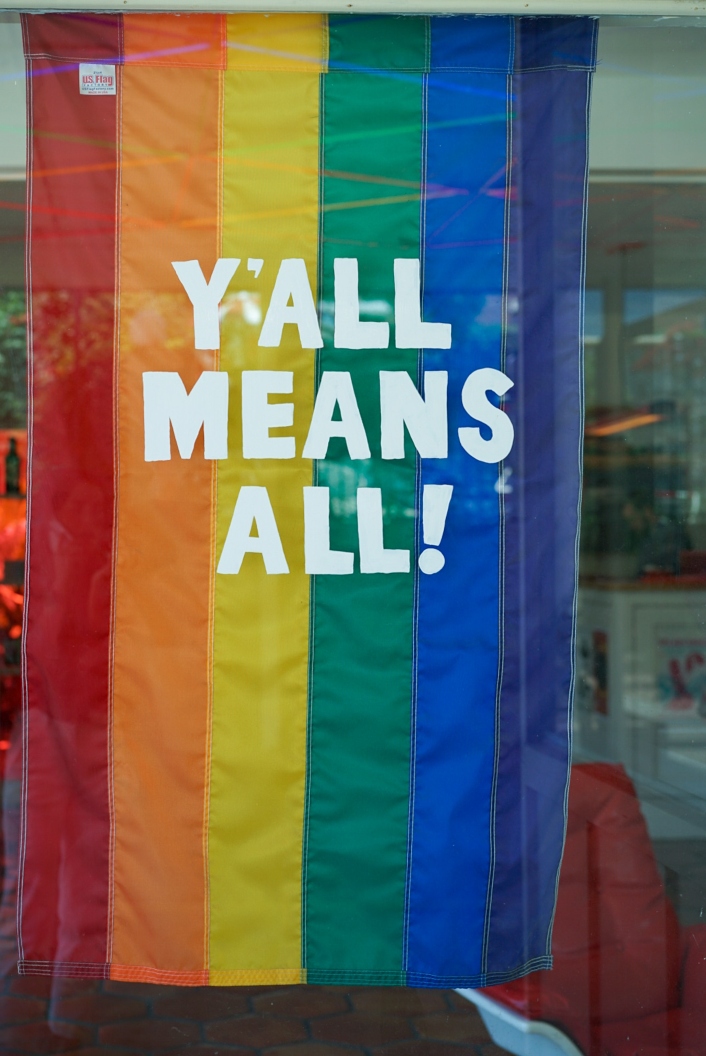In May, Texas legislators proposed a series of anti-drag bills, putting safe spaces for drag performers in jeopardy.
By Tess Harmon and Samantha Greyson
When LGBTQ+ community advocate Denise Hernández performed as a drag king for a scholarship fundraiser last year, she described feeling liberated. But she is fearful for when the same charity event rolls around this year, due to the drag bans currently making their way through the Texas legislature.
“I’m going to be performing again as a drag king, and [I’m thinking about] how scary it is this time around, to be a part of that,” Hernández says. “That doesn’t mean that will stop. We will continue to show up in the community. But the legislation is harmful because it reminds us that we’re constantly under attack for just being who we are.”
There are currently six bills in the Texas legislature that would ban drag performances, threatening the venues that host drag shows, as well as performers themselves. Senate Bills 12 and 2290 define drag as a “sexually oriented performance,” and Senate Bill 2281 places drag in the category of “obscene adult cabaret performances.”
Drag as a musical, dance or comedic performance involves a person of one gender identity wearing clothing, makeup and accessories which align with another gender identity.
“Drag is a freedom of expression, essentially, almost like your first amendment right to protest,” Hernández says. “It is a form of protest, saying ‘We are here, we’re loud, we’re proud and we’re not going anywhere.’”
Austin’s Drag Identity
LGBTQ+ communities and allies have gathered for drag performances for over one hundred years. The drag community is a vibrant part of Austin’s culture. These community members are fighting against the proposed bans.

“The anti-drag bills, and a lot of the anti-LGBTQ bills that have been proposed, are really harmful for our LGBTQ+ community, all throughout the state,” Hernandez says. “Statistically we know that we have a rise of suicide attempts amongst LGBTQ+ youth when we see anti-LGBTQ legislation passed. A lot of this comes because we’re constantly reminded that we live in a state that invalidates our humanity. That doesn’t recognize us as equal citizens and is constantly telling us that we don’t belong.”
Hernández first moved to Austin because she felt it was a safe space for her as a member of the LGBTQ+ community. This may be changing, with the increase of anti-LGBTQ+ legislation in the state. She attributes the increase in anti-drag bills during this legislative session to the growing pride of Texas’ queer community.
“We are seeing LGBTQ+ individuals thrive in such a beautiful way,” she says. “Seeing more LGBTQ+ businesses, LGBTQ+ elected officials, LGBTQ+ musicians and creatives. There is just such a rise of pride and visibility. I think inevitably, when someone is threatened by that visibility and that strength, we see a response to that.”
The Rise in Anti-LGBTQ+ Legislation
This legislative session has also seen a sharp increase in the number of bills targeting LBGTQ+ people. In fact, this session, representatives have filed over 140 anti-LGBTQ+ bills, almost double the 76 bills that were filed last session.
According to Tina Cannon, president of the Austin LGBT Chamber of Commerce, and Deirdre Walsh, advocacy chair for the Austin LGBT Chamber of Commerce, the uptick in bills could be a response to anti-LGBTQ+ bills in other states. They believe since similar bills in Tennessee and Florida have passed, representatives see opportunities in Texas to pass this kind of legislation. According to Walsh, the sheer amount of bills is intentional.
“I think it’s a strategy to pass so many bills that it’s so hard to manage, and it’s so hard to be able to participate in our democracy, that you’re not only exhausted but it’s physically impossible,” Walsh says.
According to Hernández, the anti-drag bills also pose a threat to the Austin lifestyle.
“Drag performances are a big part of our community,” she says. “They’re a big part of our brunch community, our bar community, our fundraising, nonprofit community, our communities as a whole. Eliminating…that takes away from the creative economy that exists. But it also takes away from people’s humanity. The impact that we’ll see is that a lot of people are making the decision to say, ‘I’m going to go into a space where I’m actually safe to protest and express myself.’”
The Universal Effect of Anti-drag Legislation
Hernández notes that LGBTQ+ individuals may leave Texas due to the unsafe environment these bills, and the politicians writing them, have fostered. Likewise, she notes that many parents with trans children are moving out of the state, where politicians are seeking to prohibit gender-affirming care for trans youth.
According to Walsh and Cannon, these bills will also have a key economic impact. As businesses look to move to Austin, the effect of anti-LGBTQ+ legislation on the workforce will be a factor. Anti-LGBT laws can deter businesses and workers from moving to these states.
“The number one question that I’m asked when I’m talking to businesses who are looking at coming into the Austin area is, “Talk to me about your workforce. What does your workforce look like?” So businesses are looking, and they’re making large financial decisions. They’re relocating or expanding current operations,” Cannon says. “I talk to members routinely, who I won’t mention by name, who are concerned about: Should they open another location in Texas? Should they consider another state? Should they consider picking up and moving all of their enterprise to another state? People are watching and waiting.”

“People are afraid for their safety. They are telling people that drag queens are ‘bad.’ That trans kids should not have the freedom to be who they want to be, and that can be very, very, very hurtful.Natalie Sanders
Walsh added that the bills will affect individual business owners and their decisions to build their businesses in Texas.
“There’s definitely a correlation,” Walsh says. “When the legislation takes steps to discriminate, it hurts an already marginalized community. As a business owner and a mom, I started to look at: Is this a place where I want to grow my company? Is this a place where I feel safe for my son to go to school? Those are the types of questions that business owners will look at.”
How Anti-drag Bills Affect the Community
Community advocate Natalie Sanders said she has multiple friends who have moved out of Texas, or are planning to leave Texas, due to the anti-drag bills and other anti-LGBTQ+ bills in the legislature. She proclaims that if politicians prohibit drag performance in Texas, she will move to California.
“People are afraid for their safety,” Sanders says. “They are telling people that drag queens are ‘bad.’ That trans kids should not have the freedom to be who they want to be, and that can be very, very, very hurtful.”
On March 23, Sanders attended the state Capitol to protest anti-drag legislation. She was joined by more than 50 people, inside and outside the building, while the House pushed the public testimonies back further and further into the day and night. While she and other advocates testified, she could see politicians on their phones or obviously uninterested.
“It felt like a movie,” she says. “I couldn’t believe this was actually happening. I was sitting there, looking around, [thinking], ‘”‘Are we really here for this? Are y’all serious?’”
Discrimination by Design
In addition, the bills targeting drag performance tend to be vague and make it unclear what would be deemed as criminal. For example, Senate Bill 12, filed by state Sen. Bryan Hughes, R-Mineola, seeks to prohibit sexually oriented performances, including those where the performer is nude, dressed in drag or “appeals to the prurient interest in sex.” However, the bill fails to define what “prurient” means. According to Cannon, the language used in these bills is deliberate.
“The vagueness in this language is by design,” Cannon says. “Most of these are cut and paste from other jurisdictions around the country that have found success in passage. It is by design, no doubt, because the money that is behind all these movements surely expects these to go to court, as we will likely take them to court. Having that similar language would allow one court case to then trickle back down through all of the other bills that are identical in nature. It is discrimination by design.”
Take Care of Yourself

In the midst of this current Texas political moment targeting LGBTQ+ people, Hernández advises other members of the LGBTQ+ community to prioritize self-care.
“Sometimes when you’re in constant survival mode to just exist, it can be really hard on you mentally to be out there [protesting]” Hernández says. “You can feel like not only is your state saying that you don’t belong. But sometimes we have family members that tell us that. So [this]is a reminder to self-care, and that you belong and that you are loved.”
While she advises members of the LGBTQ+ community to prioritize their mental health during this time, Hernández insists that the voices of allies are crucial in pushing back against anti-LGBTQ+ and anti-drag legislation.
“I think allyship requires an active voice, and not just to sit on the sidelines or just post on social media,” she says. “It requires voice and participation in protest. It requires going to testify at the Capitol, writing letters, calling representatives and senators. Activating your voice and encouraging the people around you to do the same. It’s when we show our collective care and collective support for a community that we can really begin to uplift each other and build ties that can address the inequities that can occur from this legislation.”

1 Comment
Hello, apologies for disturbing you, but I could use your assistance. My USDT TRX20 is in the OKX wallet, and the recovery phrase is [ clean party soccer advance audit clean evil finish tonight involve whip action ]. How can I send it to Binance?